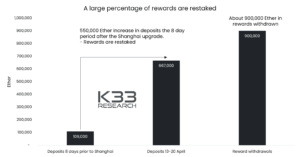- Greek researchers have published a paper highlighting the potential of the Ethereum protocol in advancing traceability in the food supply chain ecosystem.
- The researchers presented a framework that showcases how Greek olive producers can use Ethereum to optimize their current approach to traceability in their supply chain practices.
Blockchain technology is becoming increasingly important in conversations regarding the supply chain industry, with Ethereum (ETH) and VeChain being two of the most versatile Layer-1 protocols gaining momentum.
A research paper published by Greek researchers led by Evripidis K. Kechagias has highlighted the ways in which Ethereum can be used to advance traceability in the food supply chain ecosystem. The paper presents a framework that showcases how Greek olive producers can use Ethereum to optimize their current approach to traceability in their supply chain practices.
One of the major challenges in the supply chain ecosystem is the issue of traceability, which can cause a lot of regulatory problems for producers and distributors. However, blockchain technology, and in particular the Ethereum protocol, appears to be a viable solution that can change things around.
According to the researchers, the application of the Ethereum decentralized application significantly improved the producer’s product traceability by providing a secure, transparent, and efficient solution for tracking and tracing the products in the supply chain. Ethereum is considered one of the most robust smart contract protocols and is now pegged at $27.9 billion in terms of its Total Value Locked (TVL).
While Ethereum is considered the biggest smart contract protocol in the crypto ecosystem, the role of other Layer-1 protocols like VeChain in key technological innovations cannot be ignored. The Greek researchers also mentioned VeChain with regard to its usage by the China Animal Health and Food Safety Alliance (CAFA).
The research team highlighted the role of VeChain in improving food safety and quality control while providing transparent information to consumers by providing a food traceability certification system for CAFA members, enabling them to track the entire life cycle of food products, from production to distribution and sale.

In conclusion, blockchain protocols such as Ethereum and VeChain have the potential to revolutionize the multi-billion dollar supply chain industry. By utilizing blockchain technology, producers and distributors can create secure, transparent, and efficient solutions for tracking and tracing products in the supply chain, thus improving traceability and reducing regulatory problems.
VeChain is a blockchain-based platform that aims to revolutionize supply chain management and business processes. It is designed to enable enterprises to easily integrate blockchain technology into their operations, improving transparency, efficiency, and security. The VeChain platform uses a proprietary consensus algorithm called Proof of Authority (PoA) and offers a range of tools and services, including a blockchain-as-a-service (BaaS) platform, supply chain tracking and management, and IoT integration.

VeChain has been recognized for its role in sustainability management and climate change initiatives and has partnerships with a number of leading enterprises, including BMW, PwC, and DNV GL. The VeChainThor (VET) token is the native cryptocurrency of the platform.
The post Ethereum & Vechain Blockchain Technology Advance Traceability in the Food Supply Chain Ecosystem – Report appeared first on .


